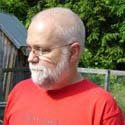Well, I haven't been able to gather my thoughts very effectively the last few days. But the woodstove is roaring this morning & I have had a couple of cups of strong black coffee. If that isn't preparation for reading Wittgenstein I don't know what is. Actually, I want to backtrack a little, since I have the sense that I've been skimming over the surface of your remarks. I'm mostly thinking of your remarks on the 26th of this month.
[A] In the simplified language W experimentally imagines, he introduces the use of this & that--but these are far from simple concepts, at least in Vietnamese, the one language other than English I am (close to) competent to speak about. In VN you use a different word when saying "this pen" (cai but), but another when saying "this dog" (con cho) & so on for different classes of objects. And in W's story, it would be "cai slab" if referring to it, but "day la slab" if naming it ostensively--"this (thing) is a slab." Actually, it's much more complicated than this. [And as is usual I have for technical reasons eliminated all of the diacritical marks from my VN examples.] The conclusion I draw from this, in the current context, is that language is by definition complex, that even an experimental "primitive" language almost immediately effloresces into something with its own currents & eddies of sound, color, meaning, orthography, & etc. So, what can we learn from a "primitive" language if no such thing exists in nature? One thing we can learn--& this is where W is going, I think--that that earlier views of language, including his own in the Tractatus, are inadequate as explanatory tools. And, from what I think I already know about W's later views of language, I'd say that he comes to the conclusion--if W ever comes to a conclusion--that in understanding language (as a philosopher) one must begin with the acceptance of both complexity & inconsistency, i.e. pluralism--a philosophical conception of language that is symmetrical with the ways in which people (as opposed to philosophers) actually learn & use language.
[B] You ask whether teaching a language can ever be imagined in "a pure state." In some ways, from another angle, I have touched on that in [A] above, but can we generalize about teaching, perhaps with assistence from my own learning of Vietnamese? It appears that VN makes a semantic distinction between "This is a table" & "Look at this table." Teaching / naming is one language game, learning / using another? Well, now I've wound up confusing myself. I'd better sit on this a while & come back to it.
[C] I was wondering whether you had a response to my suggestion about the Theory of Types? I think there is something going on there.
Philosophical Investigations
Christopher Robinson & Joseph Duemer read Wittgenstein's Philosophical Investigations


0 Comments:
Post a Comment
<< Home